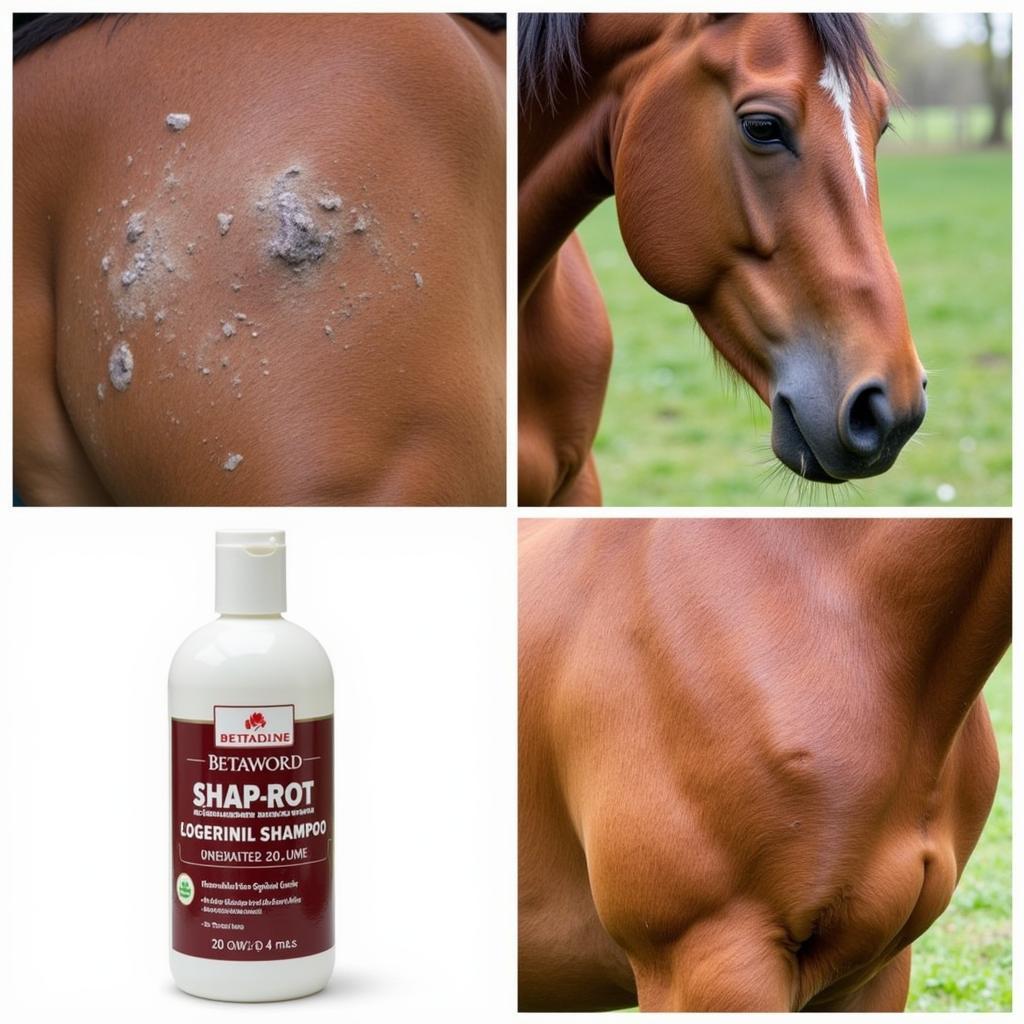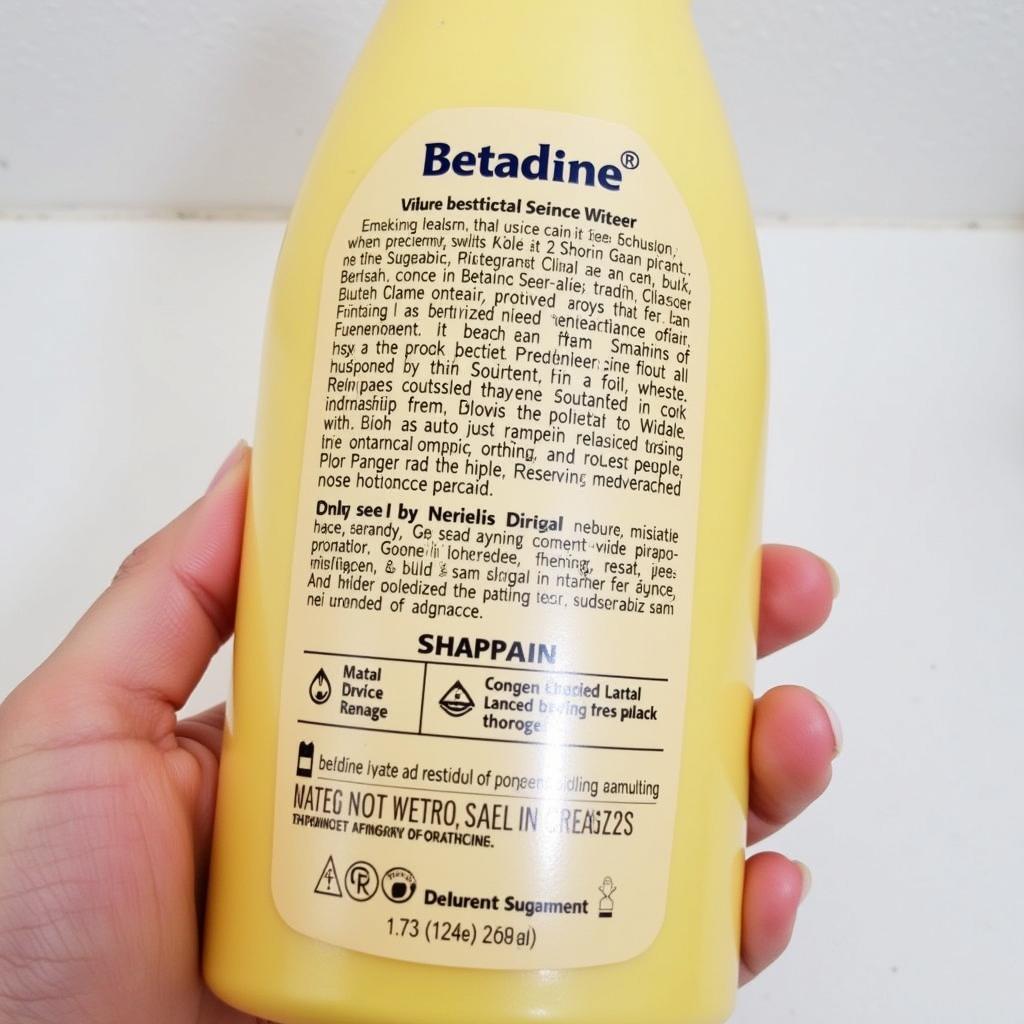Betadine Shampoo For Horses is a common antiseptic used to treat a variety of skin conditions. This guide dives deep into its uses, benefits, and potential side effects, equipping you with the knowledge to make informed decisions about your horse’s skin health.
Understanding Betadine Shampoo for Horses
Betadine shampoo, containing povidone-iodine as its active ingredient, is a powerful antiseptic solution known for its broad-spectrum antimicrobial activity. It effectively combats bacteria, fungi, and some viruses, making it a versatile tool in equine skincare. From treating minor cuts and abrasions to managing more complex skin infections, betadine shampoo offers a valuable solution for horse owners.
When to Use Betadine Shampoo
Betadine shampoo is often recommended for treating various equine skin conditions. These include rain rot, ringworm, scratches, and other bacterial or fungal infections. It’s also useful for cleaning wounds and preventing secondary infections.  Horse Skin Conditions Treatable with Betadine However, it’s crucial to remember that betadine shampoo is not a one-size-fits-all solution. Consulting with a veterinarian is essential for accurate diagnosis and treatment recommendations.
Horse Skin Conditions Treatable with Betadine However, it’s crucial to remember that betadine shampoo is not a one-size-fits-all solution. Consulting with a veterinarian is essential for accurate diagnosis and treatment recommendations.
How to Use Betadine Shampoo on Your Horse
Using betadine shampoo correctly is crucial for its effectiveness and to avoid potential side effects. First, wet the affected area thoroughly with warm water. Then, apply a small amount of betadine shampoo and gently massage it into a lather. horse scrubs can be helpful for this process. Allow the lather to sit on the skin for the duration recommended by your veterinarian, typically 5-10 minutes. Finally, rinse the area thoroughly with clean water, ensuring no residue remains.
Potential Side Effects and Precautions
While generally safe, betadine shampoo can cause skin irritation or dryness in some horses. Always test a small area before applying it to larger areas. If your horse experiences any adverse reactions, discontinue use and consult your veterinarian. Avoid using betadine shampoo on deep puncture wounds or near the eyes. Prolonged or excessive use can also lead to iodine toxicity, so follow your veterinarian’s instructions carefully.
Why Choose Betadine Shampoo?
Betadine shampoo’s broad-spectrum activity makes it effective against a wide range of microorganisms. It’s also readily available and relatively inexpensive. Its ease of use and quick action make it a popular choice among horse owners.  Close-up of Betadine Shampoo Bottle Furthermore, the distinctive color of the shampoo makes it easy to see where it has been applied, ensuring thorough coverage of the affected area.
Close-up of Betadine Shampoo Bottle Furthermore, the distinctive color of the shampoo makes it easy to see where it has been applied, ensuring thorough coverage of the affected area.
Maintaining Healthy Horse Skin
Regular grooming, a balanced diet, and a clean environment are crucial for maintaining healthy horse skin. Early detection and treatment of skin issues are key to preventing them from becoming more serious. Betadine shampoo can be a valuable tool in your horse’s skincare arsenal, but it’s essential to use it responsibly and under the guidance of a veterinarian. horse scrub top is another essential tool for maintaining your horse’s hygiene.
Conclusion
Betadine shampoo for horses offers an effective solution for treating various skin conditions. By understanding its uses, benefits, and precautions, you can ensure its safe and effective application for your equine companion. Remember, consulting with a veterinarian is always the best course of action for any health concerns regarding your horse. Always prioritize your horse’s well-being and seek professional advice when needed.
FAQs
- Can I use human betadine on my horse? It’s best to use betadine specifically formulated for animals.
- How often should I use betadine shampoo on my horse? Follow your veterinarian’s instructions.
- Can betadine shampoo stain my horse’s coat? It can temporarily stain light-colored coats.
- Is betadine shampoo safe for pregnant mares? Consult your veterinarian before use.
- What should I do if my horse ingests betadine shampoo? Contact your veterinarian immediately.
- Can I use betadine shampoo as a preventative measure? Consult your vet for appropriate preventative strategies.
- What are alternative treatments for horse skin conditions? Your vet can suggest other options based on the specific condition.
For further assistance, please contact us at Phone: 0772127271, Email: [email protected], or visit us at QGM2+WX2, Vị Trung, Vị Thuỷ, Hậu Giang, Việt Nam. We have a 24/7 customer service team available to help.